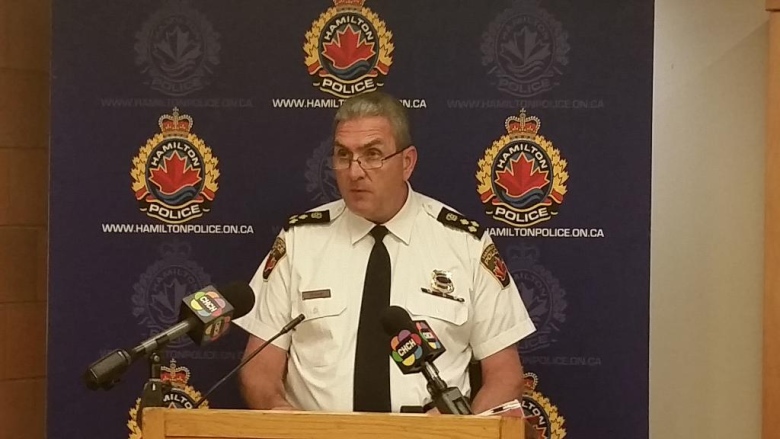5 unanswered questions about carding and street checks for Hamilton Police
Discussion of practice expected at 2 p.m. oversight meeting for police service

More than six months after an anti-racism advocacy group demandedHamilton Police stop "carding" and destroy a database of its noncriminal interactions with citizens, the demands will come before theservice'soversight board.
It will be asked to bring an end towhat are called "street checks" here.
The controversial policing toolandquestions it raises about privacy rights and racial biaswill come up atThursday's 2 p.m. meeting of theHamilton Police Services Board. A representative of the group Black, Brown, Red Lives Matter will present its position and questions to the board.It could be the first time Hamilton's police chief speaks publicly about them.
Here are some questions that have not been answered in months of this discussion. Will they be answered at Thursday's meeting?
What goes into a "street check" in Hamilton? How is that different or similar to "carding" in Toronto?
Hamilton Police keep stats on a practice called "street checks," reporting they do between 3,500 and 5,500 each year which translates into 10-15 a day.
But are Hamilton's street checks the same thing as carding? Are they similar tostreet checks elsewhere in the province, which were deemed basically the same thing as "carding" in a 2012 report?
If there's going to be clarity, police will need to connect some dots. Are the noncriminal street stops they've acknowledged they dothe same thing as street checks?
Hamilton Police have not addressedthe link drawn between "street checks" and "carding."
Thedifferent wording anddefinitions haven'tallowed for a propercomparison of practices here withwhat has provenlymajorlycontroversial in Toronto and has drawn the province and high-profile leaders into the fray.
How many street checks are in the police database? What information is recorded in the police database from noncriminal interactions with citizens?
How does an officer decide what information to ask someone for their name, where they're going, where they live, to see their ID? We don't know the guidelines placed on their discretion.
Nor is it clear what information is sitting in the Hamilton database about people who were stopped for noncriminal reasons.
The chief told activists that they could request to have information purged from the database if it was a noncriminal interaction, theysaid. But the service's Freedom of Information coordinator told CBC Hamilton that information in the police database cannot be removed.
Why does Hamilton Police find the practice valuable to policing? Has it led to solving crime?
CBC Hamilton has repeatedly asked since February to have a conversation with Chief Glenn De Caire about noncriminal street interactions, on the value of these interactions, on potential reforms to the practice and about the discretion officers apply when choosing whom to talk to, whom to ask for ID and when to record that interaction.
The police union president has said the proactive policing tools contribute to a feeling of security and safety for business owners, curbing the perception of certain neighbourhoods as dirty and unsafe.
How can Hamilton Police be sure they're not racially profiling when they choose whom to stop?
Other Ontario cities such asToronto, Kingston and Ottawa have used formal tracking programs to measure whether their interactions have disproportionate impacts on visible minorities.In Toronto, racial identifiers in so-called "carding" stops showed the practice was affecting black and brown young men at higher rates.
Hamilton doesn't collect those racial detailsin a systematic way, though Martin said the police records include "descriptors" of the people stopped. What is a descriptor?
Hamilton's community relations coordinator, Sandra Wilson, said the service would be discussingformally recording race-based information in their street checks as a way to measure whether there is evidence of racial profiling.
Hamilton Police has an anti-racism and anti-discrimination policy that states, in part, that: "This Service acknowledges that Racism, racial-profiling and other biases exist in policing."
Without a formal and consistent procedure, it's unclear how they ensure their street checks don't disproportionately impact visible minorities, as they've been shown to elsewhere in the province.
Will Hamilton Police consider adopting the reforms discussed elsewhere?
Toronto last week passed new reforms on its carding practice, including issuing receipts for interactions so people have an officer name and evidence oftheir stop.The provincial minister for Community Safety and Correctional Services haspledged to consult with cities and determine province-wide standardsfor the practice.
On the question of issuing receipts, Wilson said, "The Hamilton Police is open to examining how we can best facilitate this process of providing receipts through our Street Safety Checks interactions." She said that discussion would happen "within this year, 2015."
Activists also have asked for Hamilton to record therace data.
Neither of those potential reforms has been slated for upcoming Police Board meetings.
The police serviceadded language to a brochure and aniPhoneapp earlier this yearto emphasize that citizenshave theright to walk awayfrom a police officerwhen they're not under investigation or a witness to a crime.
Catching up on this discussion in Hamilton?
Here are some links to previous coverage that has given rise to these unanswered questions:
- Hamilton police collecting information on people not accused of crimes
- Hamilton Police do 10 to 15 street checks a day
- Hamilton police street checks linked to carding by Toronto report
- Activists looking to put street stops on public agenda
- Police street stops: Making the case for keeping race data
- Hamilton Police: 'You have the right to walk away'












_(720p).jpg)


 OFFICIAL HD MUSIC VIDEO.jpg)
.jpg)



























































































